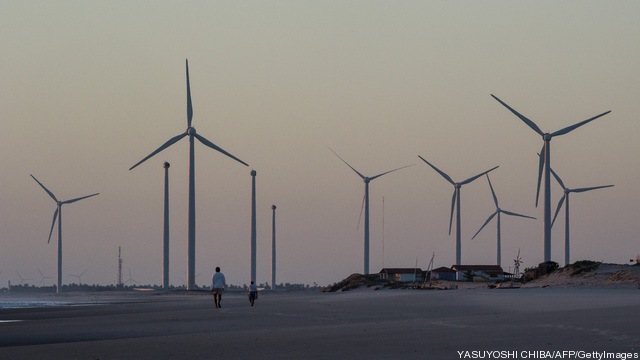 Data show that consumers in Latin America value products made with renewable energy sources, but no single brand currently stands out as having this distinction, giving companies an opportunity to establish a “green” reputation ahead of the curve.
Data show that consumers in Latin America value products made with renewable energy sources, but no single brand currently stands out as having this distinction, giving companies an opportunity to establish a “green” reputation ahead of the curve.
The Global Consumer Wind Study conducted by wind turbine manufacturer Vestas in partnership with Bloomberg quantifies and analyzes the importance people around the world place on addressing climate change and various means of doing so.
Citizens in the Latin American countries analyzed in the GCWS – Brazil, Chile and Mexico – ranked climate change as one of the more serious challenges facing the world today. Greater than 90% of the respondents in these countries said they would like to see an “increased use of” renewable energy over the next five years.
At the same time, fewer than 10% of Latin American respondents want to see an increased use of fossil fuels over the next five years.
Putting Their Money Where Their Mouths Are
Consumers in Latin America also expressed a willingness to pay a premium for a wide range of products including cars, software, cell phones and clothes, if they were made with renewable energy sources. For example over 30% of Latin American consumers “would definitely be willing” to pay a premium for a car manufactured using renewable energy, compared with only 11% in the United States, according to the GCWS.
The evidence appears to show that consumers in Latin America find climate change a pressing global concern that can be mitigated through increased use of renewable energy and would even pay more for products that advanced this goal.
However, there is currently no mechanism in the Latin American countries queried for identifying which products or brands are “greener” than others. In Brazil, 77% of respondents said that a label identifying products manufactured from renewable energy would be “very important” to them. Such a label would be very important to 59% of respondents in Mexico and 54% in Chile.
In addition, 30% to 40% of the respondents in Latin American countries said current guidance about which products are made with renewable energy is “not at all sufficient” and fewer than 10% found this guidance to be “very sufficient.”
The Brazilian Wind Energy Association (ABEEólica) and the Brazilian Clean Energy Generation Association (ABRAGEL) recognize the appetite on behalf of consumers for this kind of information and are launching a clean energy certificate program, “which will be given to companies that buy energy directly from renewable energy generators, such as wind farms, ABEEólica told Breaking Energy in an email.
“This certificate is aimed to enhance socio-environmental responsibilities of companies, and giving consumers information on the environmental impacts of their consumption, and also the option to choose a more environmental-friendly product,” ABEEólica said.
This piece appears on Breaking Energy as part of the Energy Transparency series in partnership with Vestas.




 Data show that consumers in Latin America value
Data show that consumers in Latin America value  Blessed with abundant surface water resources and a considerable amount of associated
Blessed with abundant surface water resources and a considerable amount of associated 


Renewable Energy’s Five Year Plan: Building the Transparency Set Amid Hectic Growth
By Peter Gardett‘What gets measured, gets managed,’ is an long-standing cliché of business, but its truth is often self-evident when it comes to governance. In planning energy policies, regulators and businesses and even voters must have access to the right kind of data before they can even see which problems are most pressing and which solutions most viable.
The International Energy Agency’s new five-year forecast for the renewable energy sector joins the fuel-specific reports covered by its widely read oil, natural gas and coal mid-term reports. Those fossil fuels need little introduction, and in the developed countries covered by IEA and its parent organization – the OECD – production, processing, use and reserves of the traditional energy complex is very advanced and taken as fact. Keep reading →